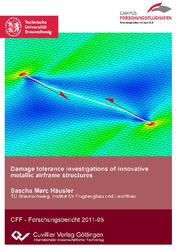| Fachbereiche | |
|---|---|
| Buchreihen (97) |
1382
|
| Nachhaltigkeit |
3
|
| Gesundheitswesen |
1
|
| Geisteswissenschaften |
2372
|
| Naturwissenschaften |
5408
|
| Ingenieurwissenschaften |
1798
|
| Allgemeine Ingenieurwissenschaften | 292 |
| Maschinenbau und Verfahrenstechnik | 863 |
| Elektrotechnik | 690 |
| Bergbau- und Hüttenwesen | 30 |
| Architektur und Bauwesen | 75 |
| Allgemein |
98
|
|
Leitlinien Unfallchirurgie
5. Auflage bestellen |
|
Erweiterte Suche
Damage tolerance investigations of innovative metallic airframe structures
Sascha Häusler (Autor)Vorschau
Inhaltsverzeichnis, Datei (130 KB)
Leseprobe, Datei (320 KB)
The continuously expanding commercial air traffic of the last decades steadily increased
the demand for highly efficient aircraft which offer extended operation times
while reducing costs and environmental impact at the same time. The associated design
requirements for reduced structural weight and improved fatigue life represent
the major challenges for todays aircraft structures and have significantly intensified
the competition between metallic and composite airframe applications. New metallic
design concepts try to face this competition by combining latest materials and
innovative manufacturing methods, like high speed machining, laser beam welding
or friction stir welding, which allows for possible savings with respect to structural
weight and manufacturing costs. However, due to their integral characteristics, the
damage tolerance behaviour of these new designs is generally inferior to the common
differential design. Reliable estimations on the fatigue life of integrally stiffened
structures consequently necessitate assessment methodologies that are capable to include
additional manufacturing influences and offer numerical efficiency in order to
be practical for parametric studies during airframe design.
Therefore, the development and enhancement of simulation methods for efficient and
reliable evaluation of cracks and crack growth represents the main objective of this
thesis. Two simulation methods are implemented and investigated for this purpose,
that are based on different approaches and intended for distinct applications. One
method is based on analytical stress function expressions and enables a very efficient
evaluation of the complete fatigue crack growth life of cracked airframe structures.
The proposed approach in this context is generally based on plane assumptions and
limited to pure mode I crack loading. In order to be able to additionally consider
crack turning under mixed mode loading, a second simulation method is presented
which implements an extended finite element framework for a mesh independent
representation of cracks in two dimensions. The additional combination with the
material force concept, as alternative crack state parameter, allows for automated
simulations of crack growth under mixed mode loading without any need for remeshing
operations.
Both simulation methods are validated based on different crack configurations and
are applied for crack growth investigations of varying configurations of integrally
stiffened panels under pure mode I and mixed mode loading conditions. In this
context, a special focus is set on the influences of additional internal stresses that
follow either from the applied manufacturing processes or an intentional prestressing
of the stiffeners. Despite the general limitation to plane considerations, the proposed
methods show a good accordance with experimental, theoretical and alternative
numerical results. This demonstrates their capabilities to simulate fatigue crack
growth and crack turning in integrally stiffened airframe structures and motivates
further research with respect to a possible extension to three-dimensional problems.
| ISBN-13 (Printausgabe) | 3869557745 |
| ISBN-13 (Printausgabe) | 9783869557748 |
| ISBN-13 (E-Book) | 9783736937741 |
| Buchendformat | A5 |
| Sprache | Englisch |
| Seitenanzahl | 288 |
| Umschlagkaschierung | glänzend |
| Auflage | 1 Aufl. |
| Band | 0 |
| Erscheinungsort | Göttingen |
| Promotionsort | TU Braunschweig |
| Erscheinungsdatum | 10.06.2011 |
| Allgemeine Einordnung | Dissertation |
| Fachbereiche |
Maschinenbau und Verfahrenstechnik
|








